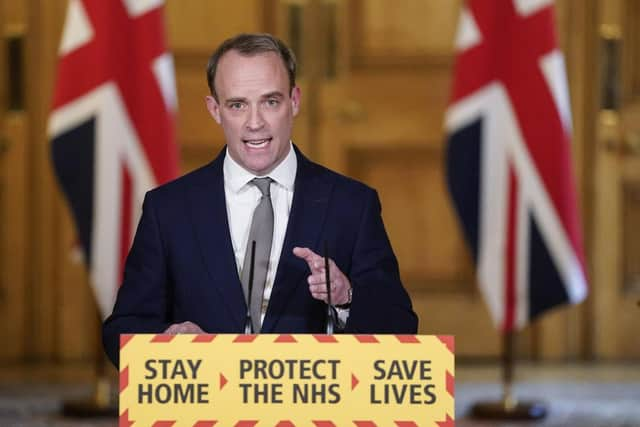UK to be worst hit in Europe as care homes raise death toll to 26,000
In the first daily bulletin including deaths in all settings across the UK, Public Health England (PHE) said the toll from Covid-19 had reached 26,097 – adding 3,811 deaths to the total since the start of the outbreak, and confirming the crisis in care homes across the country.
The total reached by the new method of reporting is around 17 per cent higher than previous data showed.
Advertisement
Hide AdAdvertisement
Hide AdOf the extra deaths added to the UK’s overall figure, around 70 per cent were outside hospital settings and around 30 per cent were in hospital.


It puts the UK well ahead of the worst affected countries in continental Europe in terms of the number of deaths, with only Belgium and Spain still ahead when deaths are calculated on a per capita basis.
The medical director of PHE, Professor Yvonne Doyle, warned the figure for deaths in care homes may be revised up further.
“In due course, those deaths sadly may occur on death certificates, so we may expect more than we are seeing at the moment, yes,” she said.
Foreign Secretary Dominic Raab, standing in for Boris Johnson at PMQs following the birth of the Prime Minister’s son, said there was a “joint horror” across the House at the number of people killed in the outbreak.
He later told the daily Downing Street press conference: “From today, we are moving to an improved daily reporting system for deaths so that deaths in all settings are included wherever the individual has tested positive for Covid-19, rather than just those in hospitals.
“Those figures show that up to yesterday on the new measure we have recorded an additional 3,811 deaths in total, and I think it is just important to say that those additional deaths were spread over the period 2 March to 28 April so they don’t represent a sudden surge.”
The death toll includes 85 NHS workers and 23 social care workers – a total of 108.
Advertisement
Hide AdAdvertisement
Hide AdAt PMQs, Labour leader Sir Keir Starmer said the UK’s death toll was “truly dreadful”.
“We are possibly on track to have one of the worst death rates in Europe,” Mr Starmer said. “On Monday, the Prime Minister said in his short speech that many were looking at our apparent success in the United Kingdom. Does the first secretary agree with me that far from success, these figures are truly dreadful?”
Mr Raab responded: “I’m going to disagree with him that it is far too early to make international comparisons. If they are to be done, they should be on a per capita basis. We are already seeing there are different ways that deaths are measured not just in the UK, but across the world.”
With a self-imposed deadline today for the government to hit 100,000 daily coronavirus tests, Mr Raab said testing had reached 52,429 on Tuesday. It brings the total number to 818,539 across the UK.
The impact of the virus on businesses and consequently the public finances has added to the pressure on ministers to set out how lockdown measures might be eased.
Downing Street was forced to deny it had watered down one of the five tests for allowing the measures to be lifted.
Rather than stating in test five that the government had to be confident any adjustments would not “risk a second peak of infections”, the wording was changed to say no weakening of restrictions would be made that risked a second peak that “overwhelms the NHS” – a lower bar.
The lockdown is due to be reviewed on May 7.
The scientific advisory group for emergencies (Sage) is working on a range of options for easing restrictions while still keeping the reproduction rate of the virus – the number of new cases linked to a single individual – below one in order to stop it spreading exponentially.
Advertisement
Hide AdAdvertisement
Hide AdMr Raab said: “It is vital we proceed carefully, guided by the scientific advice, so that our next step through this crisis is a sure footed one.
“We mustn’t gamble away the sacrifices and the progress that we have made – we must continue to follow the scientific evidence and take the right decisions at the right time.”
Prof Doyle added that it was “slightly worrying” that Monday saw the highest working day use of motor vehicles since March 23 – the start of the lockdown.
Comments
Want to join the conversation? Please or to comment on this article.